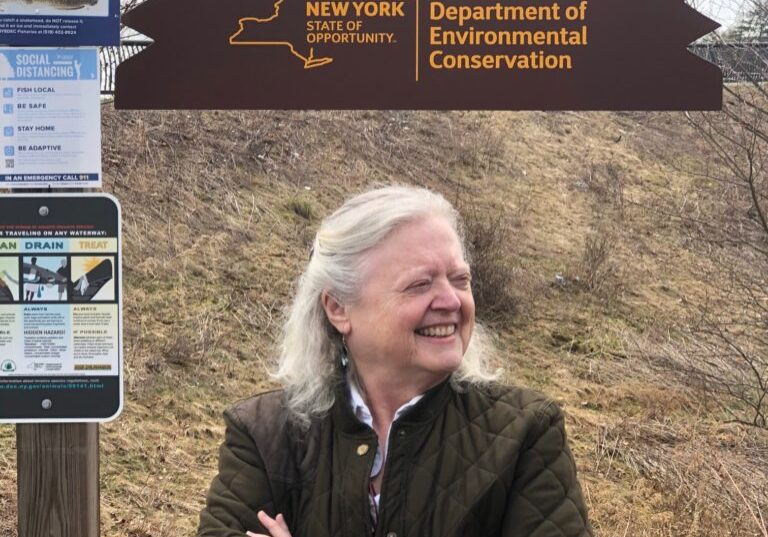
A guide to fighting warehouses in your community from a New Jersey activist
| August 9, 2024
Looking to defend your neighborhood against a proposed warehouse that you fear will harm the environment and local quality of life?
Become one part Perry Mason, one part municipal planning nerd and one part community organizer.
That was the advice offered by Brian Tarantino, the leader of a group called SWAT Hillsborough – Stop Warehouses and Trucks, at an online presentation on Wednesday sponsored by the New Jersey League of Conservation Voters.
Tarantino’s group is battling proposals for six warehouse projects in his township that would total nearly 1 million square feet and dozens of loading docks.
As Delaware Currents has previously reported, New Jersey is rife with warehouse and distribution centers, which have sprouted like weeds throughout the Garden State.
As of spring 2023, nearly 150 warehouses — totaling 88 million square feet — had been proposed, approved or built in the area that makes up the Delaware River watershed in New Jersey, a Delaware Currents investigation found. Since then, that figure has undoubtedly waxed and waned as some projects were dropped or delayed and others added.
From the Lehigh Valley in Pennsylvania to New Jersey, concerns about the effects of warehouses have grown.
Environmentalist have sounded the alarm about deforestation to make way for the vast impervious surfaces (building footprint, parking lots, etc.) that warehouses bring, which exacerbate stormwater runoff and sedimentary deposits in waterways. The large-scale projects are also associated with increased traffic, and thus noise and air pollution.
Grassroots activists in various corners of the watershed are fighting the proposals, including Tarantino’s. (See bottom of this story for a list of groups with links.) Though Hillsborough Township is outside of the Delaware River watershed, Tarantino’s recommendations are applicable broadly to any community to work within the system to fight warehouse developments.
Be Perry Mason
“It’s often difficult to know when the applicant is presenting their experts what is a good question to ask them,” Tarantino acknowledged.
Don’t ask a question you don’t already know the answer to, he said.
Be careful about offering experts an open-ended platform to “wax poetic” in response to a question, he said. Ask fact-based questions, not ones based on emotion or that make statements or offer conclusions.
Identify an issue that has an impact or that can undercut an assertion.
At the same time, don’t highlight a deficiency in an applicant’s plans that they could readily fix while the review is ongoing. Save that kind of information for later to undermine the quality of their work.
Ask pointed questions that challenged the authority of the experts.
He cited for an example, a traffic expert who was asked: How many of the hundreds of traffic reports that you have conducted found there was too much traffic? The answer was zero.
Do your homework
Read the application materials, which can be dense and technical, and point out flaws in the applicants’ methodology or where they did not deliver promised follow-up information.
“Show that you are watching, that you are reading, that you mean business,” he said, noting that professionals who prepare the applications and studies don’t catch everything.
“Part of our job is to say, ‘Hey, you were going to provide this piece of information, but you didn’t,’” he said, adding, “There are gaps out there. Look through the docs with some care.”
“If there is a chance we can make a difference, let’s get out there and make a difference,” he said.
Taratino, who has a degree in chemical engineering, said his technical background has helped him to understand some of the applicant’s materials.
“I tend to rely on a number of folks in our community group that have different expertise, including attorneys, to fully understand some of the reports,” he said.
Consider hiring outside experts
“The only thing the planning board considers is experts,” he said, so consider getting your own army of experts, in planning, stormwater, traffic and even a land-use lawyer, although they can be costly.
“The public does not have very much clout,” he said. “They can make formal comments, but not very much else.”
In the case of New Jersey planning reviews, he recommended becoming an “objector,” which gives you standing in a case and allows you to gain real-time access to correspondence and documents.
Keep interest alive
He encouraged activists to drum up interest in getting people to planning meetings and packing the seats.
“The meetings are super boring and the residents will hate them,” but he added, planners are accustomed to the meetings being just them and the applicants “and it can get a little cozy.”
Among his other recommendations: Keep the efforts sustained, mobilize other supporters, like county and state elected officials, develop your core issue and messaging, and raise money.



![DC_Image [Image 4_Assunpink Meets Delaware] meets Delaware The Assunpink Creek on its its way to meet the Delaware River. The creek passes through woods, industrial and commercial areas and spots both sparkling and filled with litter.](https://delawarecurrents.org/wp-content/uploads/bb-plugin/cache/DC_Image-4_Assunpink-meets-Delaware-1024x768-landscape-14f069364113da5e8c145e04c9f2367c-.jpg)



